
Oil Casing Material Selection: Carbon Steel VS Stainless Steel
Oil casing pipe is an integral and critical component of the petroleum industry, used to transport resources such as oil and natural gas. In the production process of oil casing, the selection of appropriate materials is crucial to ensure the quality and performance of the casing. This article will focus on the choice of carbon steel and stainless steel in the production process and analyze their advantages and disadvantages.
Carbon steel casing
Carbon steel is one of the commonly used petroleum casing materials. Carbon steel casing has good strength and corrosion resistance, and is relatively economical. In the production of oil casing, carbon steel can withstand the working environment under high temperature and high pressure conditions, has good plasticity and weldability, and is easy to manufacture and install. In addition, carbon steel can also provide high strength and rigidity to cope with complex underground environments. However, a major disadvantage of carbon steel is that it is susceptible to corrosion and therefore requires anti-corrosion treatment to extend its service life.

Stainless steel casing
Stainless steel also has certain applications in oil casing production. Stainless steel casing has excellent corrosion resistance and can resist the erosion of corrosive media such as acids, alkalis, and salts, extending the service life of the casing. In addition, stainless steel has high hardness and strength, allowing it to maintain stable performance under harsh working conditions. A significant advantage of stainless steel is its antioxidant properties, which can resist oxidation in high-temperature environments. However, the cost of stainless steel is relatively high, and the manufacturing and processing processes are also complicated, so economics need to be considered when using stainless steel casings.

Conclusion:
Carbon steel and stainless steel are commonly used material choices in the production process of oil casing. Carbon steel has good strength and plasticity, while stainless steel has excellent corrosion resistance. The choice of which material to use should be weighed based on the specific work environment and requirements. Whether it is carbon steel or stainless steel, it needs to undergo strict quality control and anti-corrosion treatment to ensure the quality and reliability of oil casing.
Extended information:
Alloy steel casing
Alloy steel is a kind of steel made of alloyed various metal elements. Commonly used alloy steel casing materials include 4130, 4140 and 13Cr. Alloy steel casing has good corrosion resistance, high temperature resistance and wear resistance, and is suitable for high temperature, high pressure and highly corrosive oil and gas well operations. However, alloy steel casings are more expensive and have relatively poor processing performance, requiring special processing techniques and equipment. Therefore, alloy steel casing may become the material of choice in underground operations under some special conditions.
To sum up, the material selection of oil casing needs to be determined according to the specific underground operating environment and needs. Carbon steel is suitable for general needs underground operations; stainless steel is suitable for highly corrosive underground operations; alloy steel is suitable for high temperature, high pressure and highly corrosive underground operations. Reasonable selection of materials can improve the effectiveness and safety of drilling.


